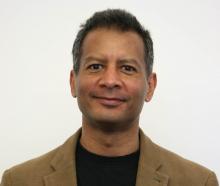You are here
- Home
- Research environment
- Support for researchers
- Careers
- Academics
- Academic view – Professor John Domingue
Academic view – Professor John Domingue

I joined The Open University (OU) in 1983 when I started my PhD in Artificial Intelligence. I was drawn here because my supervisor Marc Eisenstadt, who later set up the OU’s Knowledge Media Institute, made me an attractive proposition, and there was a real buzz in his lab within the Psychology department.
I chose artificial intelligence because I had read a well-known book called An Eternal Golden Braid which stirred my interest. I chose the OU because I saw that it supports researchers well and as a PhD student you get treated like a member of staff. The OU has always been very egalitarian.
The years I spent in the psychology lab, with people such as Judy Greene (Professor of Cognitive Psychology), gave me the feeling that you could do anything at the OU. We were encouraged to get on and do stuff and then apologise later. I was given a lot of freedom from my manager. One clever approach that Marc Eisenstadt adopted was to encourage you to research what you are interested in and to use it this within your teaching. No other university can do this at the scale of the OU. Students at the OU also get the benefits of always using the latest technologies.
I found that because of the OU’s scale, it is possible to really make a difference to the face of learning and education. Ever since I first worked here, I found that people have been very motivated by the OU mission of “being open” and this continues today with our world’s first Linked Data portal.
Because of the OU’s scale, it is possible to really make a difference to the face of learning and education. People have been very motivated by the OU mission of being open.
Professor John Domingue
Director of KMI
I started publishing research papers in the late 1980s, and since the 1990s I have worked on the semantics of the Web and online services. The work I’m most proud of is my research on the Semantic Brokers, whereby a computerised ‘agent’ can, for example, act as a travel agent and interact on my behalf online to plan my holidays from a simple request (“I’d like to go somewhere cheap, warm and with culture”).
At this stage in my career I have only ever worked at the OU and I have brought in about £7 million funding in various research projects. I travel a lot. For example, this week, I gave a talk in Rio on Monday, one in Brussels on Tuesday and I am on campus in Milton Keynes today.
So, how will my research change the world? I imagine a world where many tasks associated with managing and using online resources, for business and for personal use, will become automated. For example, companies will be able to form contractual alliances to meet mutually beneficial business objectives on-the-fly with no human in the loop. This will usher in completely new business models based upon a machine-readable web.
John Domingue is Professor of Computer Science in The Open University’s Knowledge Media Institute.